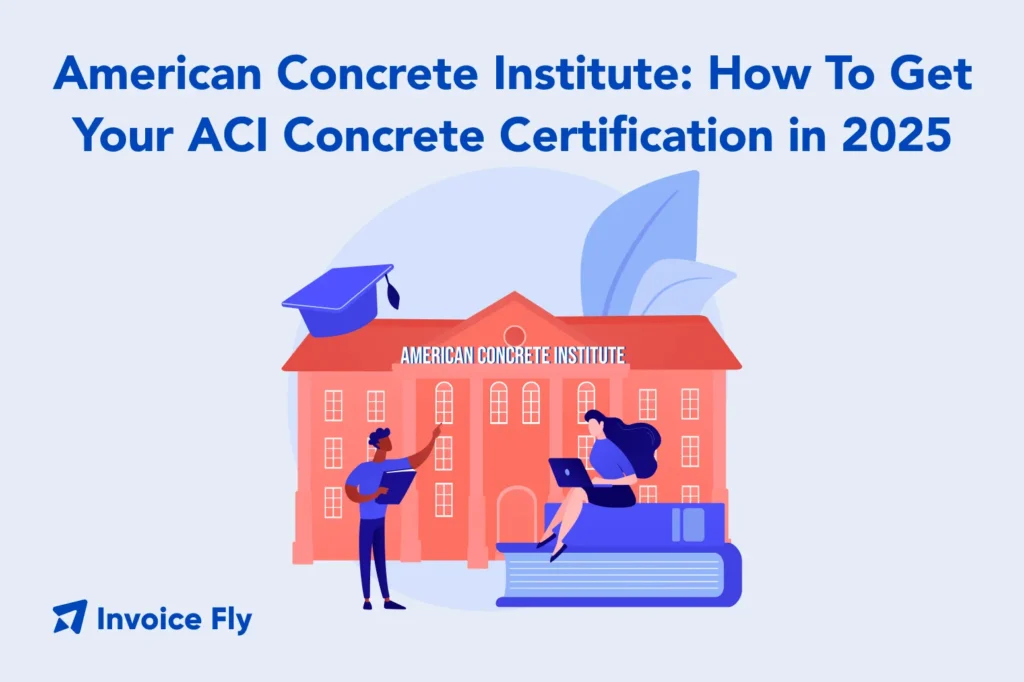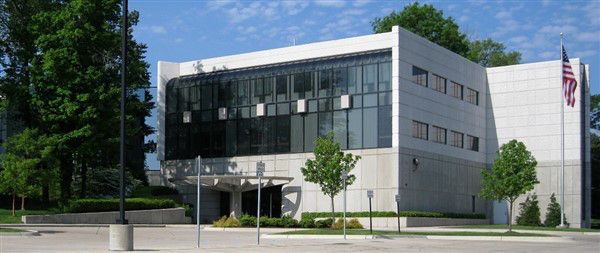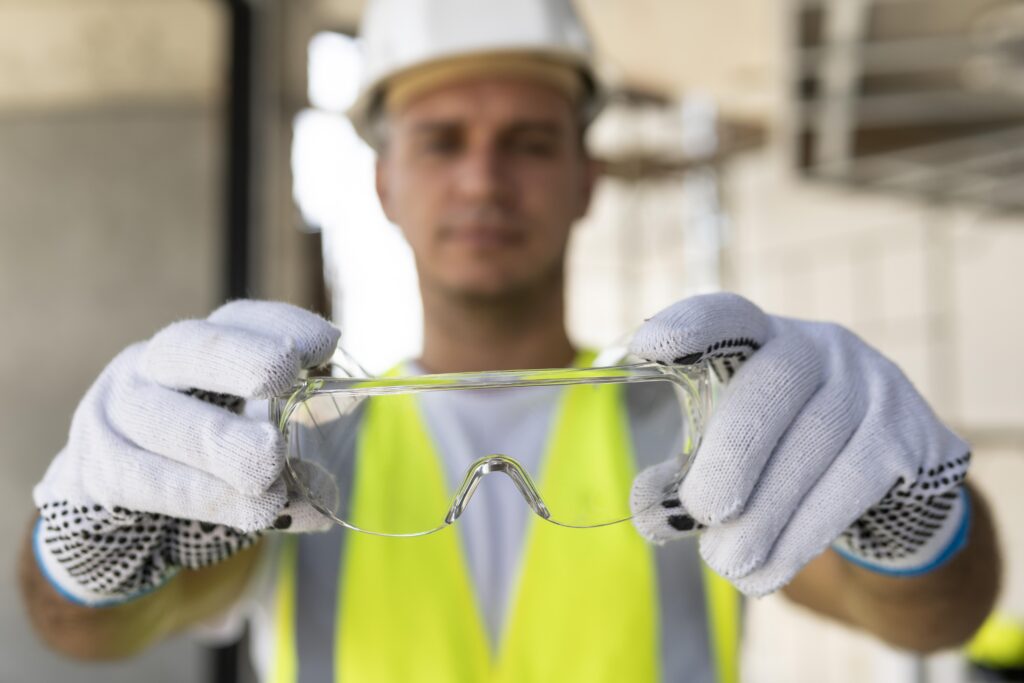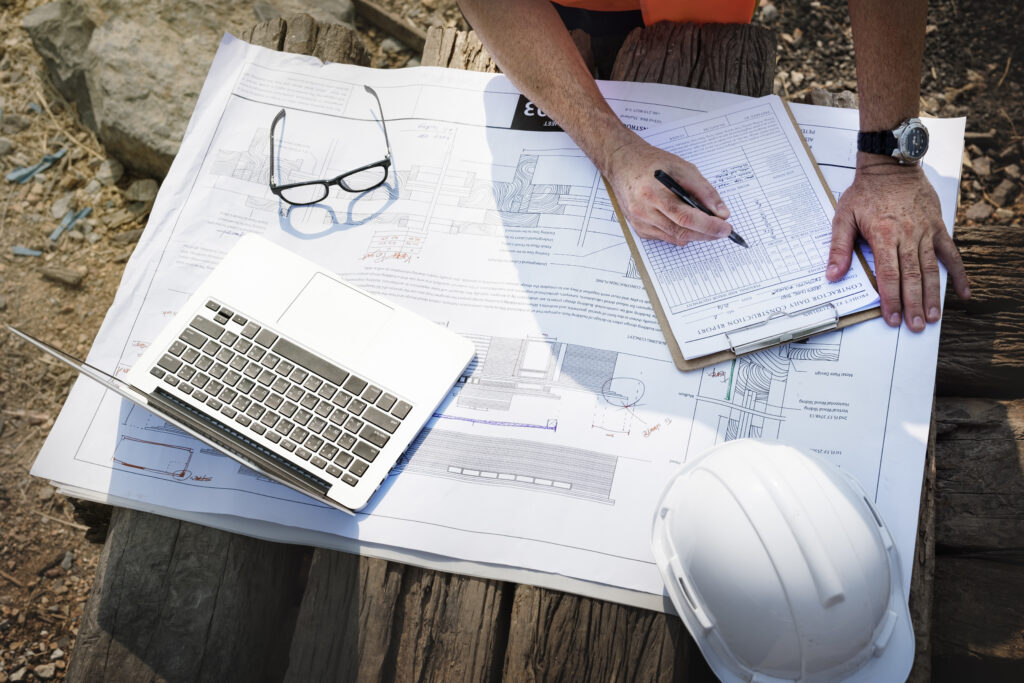American Concrete Institute: How To Get Your ACI Concrete Certification in 2025

Table of Contents
- What is the American Concrete Institute (ACI)?
- The History of ACI Certification
- Types of ACI Concrete Technician Certifications
- Other Important Concrete Organizations in the U.S.
- Steps to Get Your ACI Concrete Certification
- How to Verify Certification Status
- Managing Your Concrete Business with Professional Credentials
- Final Thoughts
- FAQs about ACI Concrete Certifications
Getting your American Concrete Institute (ACI) certification can be a game-changer for your construction career. Whether you’re new to the industry or looking to take the next step, ACI certification gives you the skills and credibility that employers and clients trust.
In today’s competitive concrete construction market, certification sets you apart. It shows you’re committed to doing quality work and following industry standards—two things that really matter on any job site.
This step-by-step guide will walk you through everything you need to know about earning your ACI certification in 2025. From choosing the right certification to preparing for the exam, you’ll get a clear roadmap for boosting your knowledge and advancing your concrete career.

What is the American Concrete Institute (ACI)?
The American Concrete Institute is the top authority on concrete design, construction, and safety standards in the U.S. and worldwide. Since 1904, ACI has set the bar with technical guidelines, education, and certification programs that support high-quality, code-compliant concrete work.
For contractors and workers, ACI certification is a trusted mark of expertise. Many projects require ACI-certified personnel for testing and placement, making it a key credential for career growth. ACI offers certifications for everything from field testing to structural design—ensuring you know the right methods, safety rules, and quality standards.
The History of ACI Certification
ACI launched its certification programs in the 1960s to bring consistency to training and testing in the growing concrete industry. It began with field testing and has since expanded to include specialties like shotcrete, strength testing, and flatwork finishing.
Each program is based on current industry practices and includes both written exams and hands-on testing. It ensures that certified professionals can apply their knowledge on the job.
Today, ACI certifications are recognized worldwide and often required by building codes for public and high-risk projects, making them essential for serious concrete professionals.

Types of ACI Concrete Technician Certifications
ACI offers several certification levels designed to match different job responsibilities and career stages. Understanding these options helps you choose the right certification path for your goals and experience level.
| Certification Level | Description | Prerequisites | Typical Job Roles |
| ACI Concrete Field Testing Technician – Grade I | Basic field testing and sampling procedures | None | Entry-level technicians, construction workers |
| ACI Concrete Laboratory Testing Technician – Grade I | Laboratory testing of concrete samples | None | Lab technicians, quality control personnel |
| ACI Concrete Field Testing Technician – Grade II | Advanced field testing and troubleshooting | Grade I certification + experience | Senior technicians, supervisors |
| ACI Concrete Laboratory Testing Technician – Grade II | Complex laboratory procedures and analysis | Grade I certification + experience | Senior lab technicians, quality managers |
| ACI Concrete Flatwork Technician | Placement and finishing of concrete flatwork | None | Finishers, concrete contractors |
| ACI Shotcrete Nozzleman | Application of shotcrete using various methods | None | Specialized shotcrete applicators |
Grade I certifications are ideal for beginners, covering basic testing, safety, and quality control.
Grade II certifications go deeper, focusing on advanced procedures and are often required for supervisory roles.
Specialty certifications like Flatwork Technician or Shotcrete Nozzleman are perfect for workers focusing on specific techniques or expanding into niche services.

Other Important Concrete Organizations in the U.S.
While ACI is the most recognized name in concrete certification, a few other groups also offer valuable programs for concrete professionals:
National Ready-Mixed Concrete Association (NRMCA)
NRMCA focuses on the ready-mix side of the industry. It offers certifications for concrete truck drivers, covering delivery, safety, and customer service. NRMCA also provides training on mix specs, placement tips, and troubleshooting—great for contractors who work with ready-mix concrete often.
National Institute for Certification in Engineering Technologies (NICET)
NICET offers certifications for technicians in materials testing and quality control. These credentials are helpful for those working in labs, engineering firms, or on government projects. NICET certifications involve both exams and proof of work experience and are often preferred for high-level testing roles.
Steps to Get Your ACI Concrete Certification
Earning your ACI certification takes some planning, but it’s very doable with the right approach. Follow these simple steps to get started:
1. Check the Requirements
Each ACI certification has different rules. Most Grade I programs are open to beginners with no experience. Grade IIprograms usually require a Grade I certification plus work experience. Most certifications require you to be at least 18 years old, and some may ask for physical ability or safety training.
Remember: ACI certifications must be renewed every 5 years, so be ready for continuing education or retesting later on.
2. Study the Right Materials
Use the official ACI workbook for your certification. It covers safety rules, testing steps, and quality checks. Take practice tests to see where you need to focus. Studying with a group can help you stay on track and share tips.
You can also find extra resources on ACI’s website or industry forums to boost your prep.
3. Take a Training Course
You can self-study, but formal training helps a lot—especially with hands-on testing. Many ACI-approved courses are available both online and in person. In-person classes often include lab practice with real tools and equipment.
Training usually costs $800 to $1,500, including materials and the exam. Some employers will cover the cost if it’s needed for your job.
4. Master Key Lab Procedures
Hands-on skills matter. Most ACI certifications require you to perform lab tests exactly as shown in ACI standards. You’ll need to be confident with:
- Slump tests
- Air content checks
- Unit weight measurements
- Cylinder prep for strength testing
Practice until each step feels natural. Don’t just memorize. Understand why each step matters. Knowing the reasons behind the process helps you fix problems in the field. Also, study safety procedures, like how to handle tools properly and what to do in an emergency.
5. Schedule Your Exam
ACI exams are offered at certified testing centers across the U.S. Some locations fill up quickly, so book early. Check the ACI website for dates and locations near you.
- Cost: Most exams range from $300–$600 and include both written and performance parts.
- Heads-up: You might need to bring ID, safety gear, or wear specific clothing.

6. What to Expect on Exam Day
Written Exam
You’ll get about 60–100 multiple-choice questions. Topics include safety, tools, procedures, and test standards. Some questions include diagrams or photos—so practice identifying equipment and steps by sight. Most tests last 2–3 hours.
Performance Exam
This part tests your skills using real tools. You’ll be timed and graded on how well you perform tasks like slump tests and sample prep. Practice is key. Examiners will watch your sequence, accuracy, and safety.
7. Tips for Success
- Start early. Studying a little each day works better than cramming.
- Learn the “why.” Understanding the purpose behind steps helps when something unexpected happens.
- Practice hands-on. Try working with real equipment before the exam if possible.
- Stay sharp. Get plenty of sleep, eat well, and manage stress—especially in the final week.
How to Verify Certification Status
ACI maintains an online database where employers and project owners can verify current certification status. This verification system helps prevent fraud and ensures that only qualified personnel perform critical concrete testing and placement tasks.
The verification system includes information about certification dates, expiration dates, and any restrictions or limitations on individual certifications. Some certifications may be limited to specific types of work or equipment based on training or examination performance.
Employers should verify certification status before assigning critical tasks to certified personnel. Project specifications often require current certification, and using personnel with expired credentials can result in work rejection or legal liability.
Certified individuals should monitor their certification status and plan for renewal well before expiration dates. The renewal process typically requires completion of continuing education units or re-examination depending on the specific certification type.

Managing Your Concrete Business with Professional Credentials
Obtaining ACI certification not only advances your technical skills but also enhances your business credibility when working as an independent contractor. Many concrete companies find that certified personnel can command higher rates and attract more discriminating clients.
If you’re starting your own concrete business, ACI certification provides a competitive advantage in bidding for quality projects. Clients and general contractors often prefer working with certified concrete contractors because it reduces their risk and ensures compliance with project specifications.
Professional certification also supports better pricing strategies for your concrete services. Understanding how to price concrete jobs becomes easier when you can justify premium rates based on your certified expertise and quality assurance capabilities.
Proper business management, including professional invoicing, complements your technical credentials. Using an Invoice Maker helps create professional documentation that reinforces your credibility with clients and supports your premium pricing structure.
Consider how certification affects your business planning, including insurance requirements and employee compensation. Insurance for concrete contractors may offer better rates for businesses with certified personnel, while concrete worker salaries typically reflect certification levels and specializations.

Final Thoughts
Earning your ACI concrete certification is one of the smartest moves you can make—whether you’re working for a concrete company or launching your own business. It gives you credibility, confidence, and a competitive edge in a growing industry.
While the certification process takes time and effort, the payoff is worth it. Certified professionals often enjoy better job opportunities, higher pay, and access to more complex (and rewarding) projects.
But remember, certification is just the beginning. The concrete industry keeps evolving with new materials, tools, and technologies. Staying current through continuing education and advanced certifications will help you stay sharp and in demand.
Whether you’re focused on residential concrete, commercial construction, or industrial projects, ACI certification lays the foundation for long-term success. Paired with theRight business licensing and a strong company name, it helps build your reputation as a trusted, skilled professional in the world of concrete construction.
FAQs about ACI Concrete Certifications
It depends on your prep method and schedule. If you’re self-studying, expect to spend around 4–8 weeks preparing. If you take a formal training course, you may be ready in 2–4 weeks. Keep in mind that exam scheduling can add extra time based on availability in your area.
The total cost typically ranges from $800 to $1,500, including training materials, course fees, and exam costs. Some employers cover or reimburse certification expenses—especially when it’s required for the job.
For Grade I certification, no experience is required, making it ideal for entry-level workers. Grade II certifications usually require you to hold a Grade I and have documented work experience. Always check the specific requirements for the certification you’re pursuing.
Most ACI certifications are valid for five years. Renewal usually involves completing continuing education or passing a recertification exam. Be sure to plan ahead for both time and cost when your renewal period approaches.
Yes. But it’s not always recommended. While formal training isn’t required, it greatly increases your chances of passing. Self-study using official ACI materials is possible, but hands-on practice with tools and procedures is essential, especially for the performance portion of the exam.
